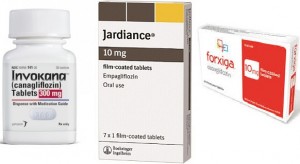 UPDATE: (May 2019) – A new study published May 6th in the journal Annals of Internal Medicine, indicates the risk of developing “Fournier’s gangrene” from taking SGLT-2 Inhibitors is greater than initially believed. The researchers, examining information from the FDA’s Adverse Reporting System, discovered “Fournier’s gangrene” occurred in 55 people taking SGLT-2 Inhibitors (Invokana, Invokamet, Farxiga & Jardiance) between March 1, 2013, and January 31, 2019. In comparison, researchers found only 19 cases of the disease in people taking other diabetes medications between 1984 and January 31, 2019.
UPDATE: (May 2019) – A new study published May 6th in the journal Annals of Internal Medicine, indicates the risk of developing “Fournier’s gangrene” from taking SGLT-2 Inhibitors is greater than initially believed. The researchers, examining information from the FDA’s Adverse Reporting System, discovered “Fournier’s gangrene” occurred in 55 people taking SGLT-2 Inhibitors (Invokana, Invokamet, Farxiga & Jardiance) between March 1, 2013, and January 31, 2019. In comparison, researchers found only 19 cases of the disease in people taking other diabetes medications between 1984 and January 31, 2019.
“Fournier’s gangrene” is an necrotizing infection that affects the tissue, muscles, fat, nerves and blood vessels of the perineum; the area around/between the genitals and the rectum. The condition can cause extreme pain in the scrotum, penis, vulva, vagina, or anal areas, as well as fever and a general, overall feeling of fatigue and illness. The affected area may appear red, emit a foul odor, and become gangrenous causing tissue to die. If left untreated, “Fournier’s gangrene” can spread to the thighs, into the abdominal wall, and up to the chest. The condition is generally treated with broad-spectrum antibiotics to kill the infection, and surgery to remove dead tissue. The condition can quickly worsen and result in death.
If you or a loved one were diagnosed with “Fournier’s gangrene” after taking Invokana, Invokamet, Jardiance or Farxiga, contact us online or call us at 1-866-252-3535.
Do not stop taking any medication without consulting your healthcare provider.
